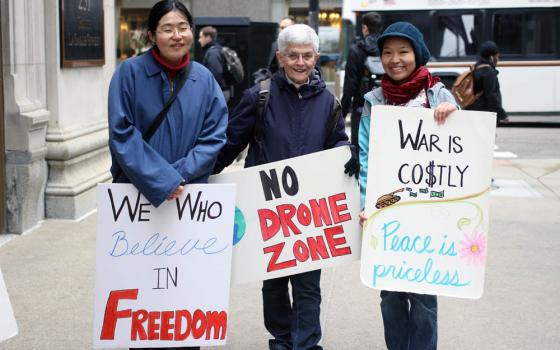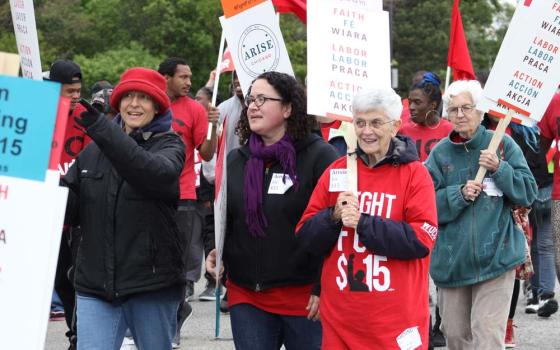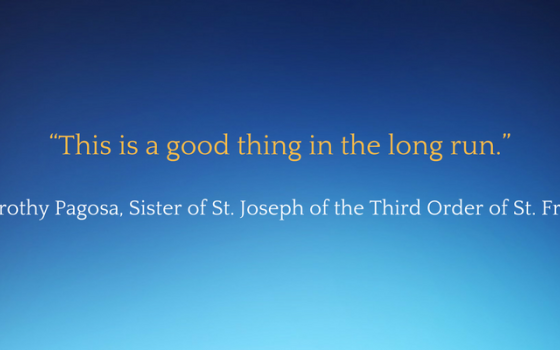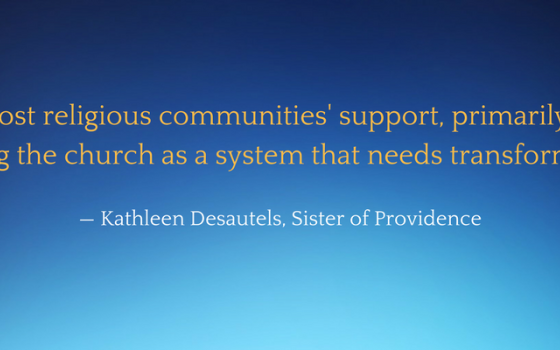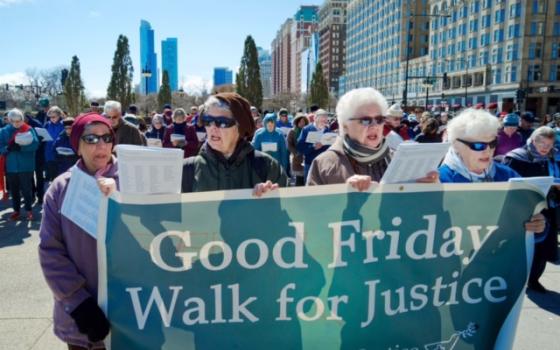By most accounts, two things allowed the 8th Day Center for Justice to come to fruition in 1974: a new churchwide interest in social justice sparked by the Second Vatican Council in the early 1960s and the dogged work of women religious.
For more than four decades, 8th Day has served as a prophetic voice against injustice, educating others about the oppressive structures operating in their own backyards.
Now, 43 years after 8th Day first opened its doors in downtown Chicago, women religious are shepherding the center through its final year — an intentionally monikered "year of gratitude" that kicks off Sept. 30.
"We don't want to spend the year crying," said Sr. Dorothy Pagosa, a Sister of St. Joseph of the Third Order of St. Francis who joined the 8th Day staff in 1986. "This is a good thing in the long run."
It's good, Pagosa and other staffers say, because there is no longer a critical need in 2017 for an organization like 8th Day — one that looks at the connected systems of injustice in the United States — to exist.
That doesn't mean the nation's justice problems have been solved, staffers are quick to point out. However, unlike the situation 40 years ago, it's now taken for granted that justice work must be intersectional.
"You have Black Lives Matter folks supporting immigration rights work. You have environmentalists doing work and making the connections with women's lives," said Sr. Kathleen Desautels, a Sister of Providence of St. Mary-of-the-Woods, Indiana, who joined the staff in 1986. "The interconnectedness and the outpouring of groups working together is palpable. It's a wonderful experience to have worked this long and to see it come together the way it has."
And so, also keeping in mind the declining capacity of religious congregations to provide support for 8th Day, the remaining staff are taking a year to express their gratitude to the groups they partnered with and the coalitions that supported them before closing the center for good.
"We wanted to go out in a way that we thought was reflective of the values that we work out of," Desautels said, "values of mutuality, of cooperation, coalition-building and standing up for what are the needs of our world and our church."
Sisters 'have carried the torch'
Six religious congregations founded the 8th Day Center for Justice: the Sisters of Mercy; the Sisters of Charity of the Blessed Virgin Mary; the Adrian Dominican Sisters; the Sisters of Providence of St. Mary-of-the-Woods; the Sisters, Servants of the Immaculate Heart of Mary; and the Dominican Central Province. Each congregation promised to provide a staff member for the center, which takes its name from the Augustinian idea of an eighth day that followed the seven days of creation, as well as financial support.
Since then, a number of communities have come and gone as 8th Day sponsors, and today, 35 congregations — still mostly women's — financially support the center.
"We have women's communities and a few good men," Desautels likes to joke.
Dominican Fr. Charles Dahm, one of the original staff members and the current director of domestic violence outreach for the Archdiocese of Chicago, is more direct.
"I do think the sisters in particular are focused on [social justice]," he said. "They have carried the torch, whereas men religious have not."
Yet, it's been 8th Day's stances on sexism within the Catholic Church that have gotten the center in the most hot water. For instance, in 2011, the center made headlines when it hosted a screening of the documentary "Pink Smoke Over the Vatican," which chronicles the women's ordination movement.
Chicago Cardinal Francis George wrote to 8th Day sponsors, asking them to revoke their support of the screening.
"We've lost religious communities' support, primarily for our seeing the church as a system that needs transforming," Desautels said. "As I always say, I could sit on a missile silo for antiwar, and most of our communities would understand that, and there would be no problem. But once you make a statement relative to women's ordination or reproductive justice issues — those are ones that church people find more difficult to support."
Outside of the church, 8th Day has tackled a number of issues, including nuclear weapons, white supremacy, President Donald Trump's Muslim travel ban and raising the minimum wage in Chicago to $15 an hour. Staffers have also started programs to educate religious novices, both men and women, about social justice ministries, and have tried to get Chicago parishes involved in justice work.
None of this work was done alone. Working in coalition has been the touchstone of 8th Day, which often served as a bridge between different justice organizations or between non-Catholic organizations and the church. In recent years, the center has partnered with groups like Jewish Voice for Peace, Comisión Intereclesial de Justicia y Paz, and the Global Climate Convergence. It's been the center's partners that for the last 36 years have staged 8th Day's annual Good Friday Walk for Justice, portraying what Pagosa called "modern-day crucifixions."
"In a progressive movement often marred by petty turf issues and scrambles to get credit for various initiatives, 8th Day's humility and integrity were always a rock," said Andy Thayer, co-founder of the Gay Liberation Network, another one of 8th Day's partners. "The organization and its people rarely got the recognition that, while they did not seek it, they richly deserved."
One of 8th Day's less obvious ministries has been helping fledgling justice groups by serving as their fiscal agent. Under this arrangement, said Sister of Charity of the Blessed Virgin Mary Joellen McCarthy, 8th Day's business office coordinator, the center has loaned its administrative and financial processes to groups that didn't have the capacity to provide their own.
That's another reason the center is taking a year to shut down.
"We wanted to make sure we didn't just cut them off and say, 'Good luck. Hope you can find something.' We wanted to give them time," McCarthy said.
'Not just a pfft'
There's still a lot to be determined regarding 8th Day's final year. For sure, there will be a gathering of gratitude to open the year on Sept. 30 and a final celebration in the summer of 2018, but staffers don't know if they'll do another Good Friday walk.
There's also the question of what to do with the remaining money.
To the current staffers' surprise, a local priest — one unaffiliated with the center — recently bequeathed a large portion of his estate to 8th Day. Staffers will spend part of the year brainstorming with their partners to figure out where that money should go.
"There'll be a lot that we have to do corporately to close down 8th Day. I mean, that goes without saying," Pagosa said. "But also, what can we do spiritually to make it flow so it's not just a pfft, that it's a strong statement of who we were."
"In many ways, it's sad, but in another way, there are different needs for different times," Desautels said. "There was a real need after Vatican II for religious communities to get on board with understanding systemic change." Now, she added, there's a need for justice promoters to return to their motherhouses and continue doing justice work with the semi-retired sisters there.
Pagosa agreed that it's a new era for justice work.
"You look at Heather Heyer and the young people that come forth and are really putting it on the line, challenging the powers, speaking truth to power," she said. "People have not given up during a time where it might be easy to just say, 'Oh, heck with it.' People aren't doing that. If anything, they're coming to the fore even stronger."
[Dawn Araujo-Hawkins is a Global Sisters Report staff writer. Her email address is [email protected]. Follow her on Twitter: @dawn_cherie.]
